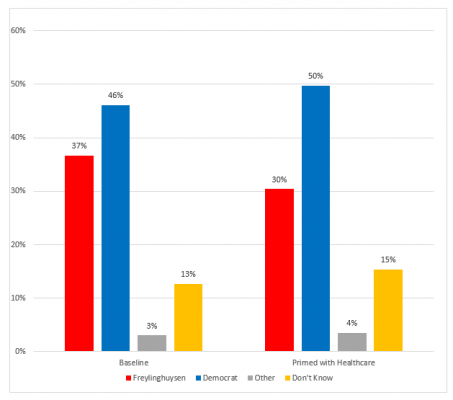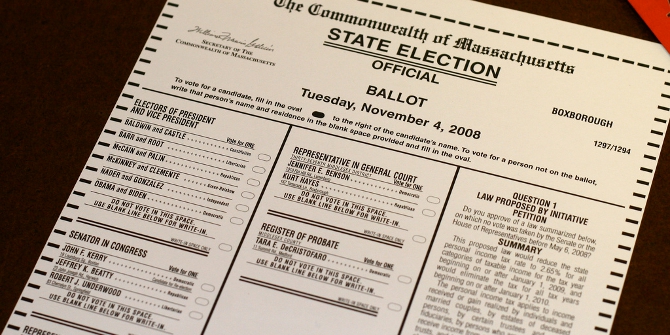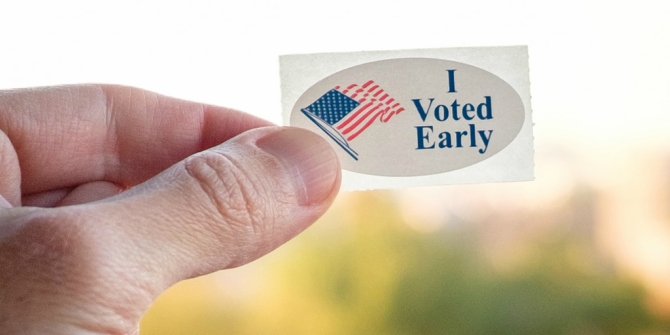 Republicans trying to pass an Obamacare repeal bill found themselves supporting a historically unpopular bill, and are paying a steep electoral price despite the collapse of the effort. Looking at the results of a new experiment, Dan Cassino finds that support for the bill is costing one powerful incumbent 11 points in a race against an unnamed Democrat.
Republicans trying to pass an Obamacare repeal bill found themselves supporting a historically unpopular bill, and are paying a steep electoral price despite the collapse of the effort. Looking at the results of a new experiment, Dan Cassino finds that support for the bill is costing one powerful incumbent 11 points in a race against an unnamed Democrat.
After the collapse of the Republican effort to repeal the Affordable Care Act, dozens of members of Republican incumbents in the House and Senate are left having publicly supported a historically unpopular bill, with nothing to show for their efforts. Prior to the failure – for now – of repeal efforts in the Senate, it had been predicted that passing an unpopular healthcare measure could be disastrous for Republicans in the next general election (though it might help them in their party primaries). Now, having put themselves on the line for an unpopular bill, how much damage has the repeal effort done to vulnerable Republican incumbents who voted for it? A new survey experiment carried out in a swing district in New Jersey shows exactly how crippling the results might be.
The incumbent in this case is Rodney Frelinghuysen, who came into office in the 1994 Republican wave, and has cruised to re-election in his affluent, suburban New Jersey district ever since. He’s been so often without effective opposition in his bids that, in 2000, Michael Moore famously ran a ficus tree against him. That seniority, along with healthy contributions to the party and a strong record of party loyalty, has allowed him to rise to be the chair of the House appropriations committee, one of the most powerful roles in the Congress.
However, after the 2010 census, his district was redrawn, adding in several heavily Democratic areas. In the 2016 Presidential election, Trump won the district by one point, despite having gone for Romney by 5 points in 2012. After Trump’s election, pressure on Frelinghuysen from constituents increased dramatically, with demands for a town hall meeting – he hasn’t held an in-person town hall meeting in several years – and so many contacts to his outreach offices to lead him to ask constituents to stop calling. On top of this, he used a fundraising letter to inform a local bank that one of their employees was a “ringleader” in a group organizing in the district; the employee left the bank as a result, attracting national attention and an ethics complaint.
So, Frelinghuysen is similar to a lot of House incumbents: caught between a district that voted narrowly for Trump, but with a newly energized Democratic base. Like other Republicans, he came out against the initial version of the House healthcare plan, then voted in favor of the plan which eventually passed the House, though he has said that he does not support many of the provisions of the House bill, and hoped that the Senate would come up with something better.
All of this has made Frelinghuysen vulnerable in next year’s midterm; the Cook Political Report moved the district from “safe Republican” to “lean Republican,” and he has already attracted a number of challengers, both Republicans and Democrats. The strongest evidence for his vulnerability, though, comes from a poll carried out by NJ11th for Change, the first publicly released poll of the district. In the modified voter list sample, Frelinghuysen is down nine points against an unnamed Democratic challenger, 37 to 46. That, in and of itself, is surprising for an incumbent who’s won every re-election bid by a wide margin.
What’s more surprising is the effect of his vote on healthcare. Embedded in the survey was an experiment: half of the respondents (412 respondents) were asked about their vote choice in next year’s election early in the survey, and the other half (398 respondents) were asked only after being asked Frelinghuysen’s AHCA vote. Respondents disapproved of his vote by a wide margin, 60 to 24, and while Frelinghuysen was down by 9 points among respondents who weren’t primed with his healthcare vote, the unnamed Democrat was up by 20 points, 50 to 30, among respondents who were asked about healthcare first. To put it simply, his vote on healthcare is costing him 11 points overall in the district, much of that among independents. In the baseline condition, independents favor him over the Democrat by 14; when primed with the AHCA vote, they prefer the Democrat by 15.
Figure 1. Effect of AHCA priming on vote choice

Of course, Frelinghuysen still has a lot of advantages: his name recognition is aided by a family line that goes back to the Revolutionary War, and his position on the appropriations committee gives him access to enormous fundraising opportunities. But he’s also very similar to many other Republicans from formerly safe districts: pushed into voting for a healthcare bill they didn’t necessarily like, and now facing real repercussions in their districts for having done so. It’s been pointed out that Republicans have an inherent advantage in the House, and that Democrats would have to move any number of vulnerable districts to have a chance of taking the House. But if support of the AHCA is costing other Republicans in close districts anything like the 11 points it’s costing Frelinghuysen, next year’s midterms could be a bloodbath for Republicans.
Author’s note: The organization NJ11th for Change gave the author permission to access to the questionnaire, methodology and raw data for the poll in order to verify their results; Fairleigh Dickinson University’s PublicMind was not associated with the poll in any way.
“Vote No TrumpCare and the Unaffordable Care Act”-ACA rally at Congressman Lance’s Office in Flemington, NJ” by John Flores is licensed under CC BY-SA 2.0.
Please read our comments policy before commenting.
Note: This article gives the views of the author, and not the position of USAPP – American Politics and Policy, nor of the London School of Economics.
Shortened URL for this post: http://bit.ly/2uXUb9U
_________________________________
 Dan Cassino – Fairleigh Dickinson University
Dan Cassino – Fairleigh Dickinson University
Dan Cassino is an associate professor of Political Science at Fairleigh Dickinson University in Madison, New Jersey, who studies political psychology and polling. His most recent book is “Fox News and American Politics,” and his forthcoming book, “Social Research Methods by Example: Applications in the Modern World,” with Yasemin Besen-Cassino, will be released in July, 2017.






